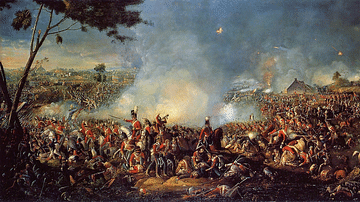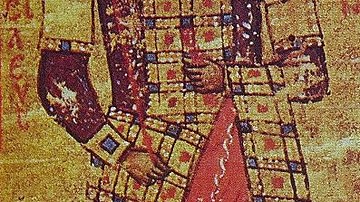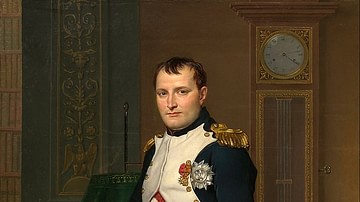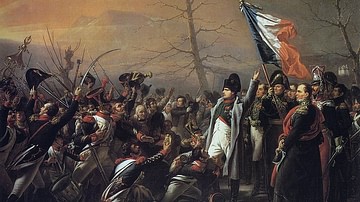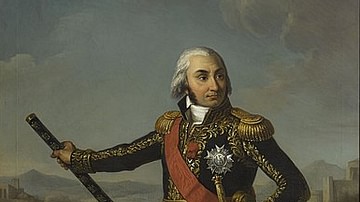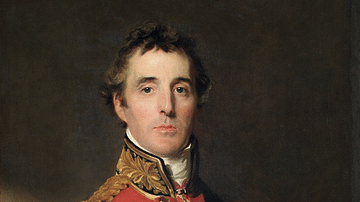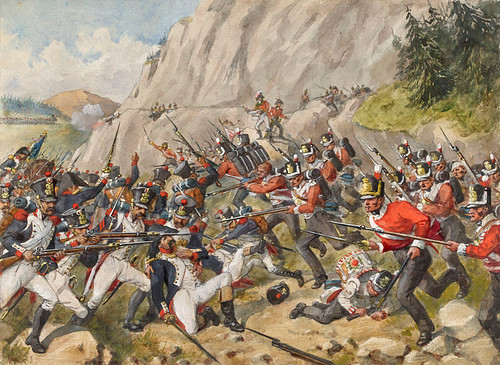
The Peninsular War (1807-1814), also known as the War of Spanish Independence, was a major conflict of the Napoleonic Wars (1803-1815) that was waged in the Iberian Peninsula by Portugal, Spain, and the United Kingdom against the invading First French Empire of Napoleon I (r. 1804-1814; 1815). It remains the bloodiest episode in the modern history of Spain.
The war began in October 1807, after the Kingdom of Portugal was slow to respond to a French demand to stop trading with Britain. By 30 November, French soldiers had occupied Lisbon, forcing the Portuguese royal family to flee to their colony of Brazil, where they set up a government in exile. Eager to expand his control over the entire Iberian Peninsula, Napoleon then turned against his erstwhile ally of Spain, deposing the Spanish House of Bourbon and installing his brother, Joseph Bonaparte, as King of Spain. Napoleon had gravely underestimated Spanish patriotism. After the Dos de Mayo Uprising of 1808, much of the country rose in revolt against the French occupation. The Spanish won an early victory at the Battle of Bailén (16-19 July 1808), which marked the first major defeat of a French Imperial army, inspiring further resistance movements.
In the next five years, hundreds of thousands of French soldiers were sent to fight in Spain and Portugal, putting a strain on French military resources that would become sorely needed elsewhere; for this reason, Napoleon referred to the Peninsular War as his "Spanish Ulcer". The period was also characterized by brutally effective guerilla warfare, with guerilla fighters killing more French soldiers than the major battles between regular troops. Although the tide of war shifted back and forth, France's hold over the country eventually began to slip; the victory of Sir Arthur Wellesley, Duke of Wellington (1769-1852) and his Anglo-Spanish-Portuguese army at the Battle of Vitoria (21 June 1813) finally sealed the fate of Bonapartist Spain. The Bourbon King Ferdinand VII of Spain was restored on 11 December 1813 as Wellington's army pushed on into France. Hostilities ended after the first abdication of Napoleon in April 1814.
Invasion of Portugal
The Treaties of Tilsit in July 1807 left Napoleon at the height of his power. He had spent the previous two years vanquishing the armies of Austria, Prussia, and Russia, and he now ruled most of Western and Central Europe, his authority stretching from the Pyrenees Mountains to the Niemen River. Portugal and Spain remained outside of Napoleon's control. While neither nation posed an immediate threat to the Napoleonic Empire, each had the potential of becoming a frustrating obstacle to Napoleon's ultimate goal of defeating Great Britain.
Portugal was especially vexing in this regard. Having formed an alliance with England in 1373, Portugal was Britain's oldest continental ally, and the two nations were still closely tied together through trade. British warships had even used Portuguese ports in their operations against France. Spain, on the other hand, was a French ally, albeit an unreliable one; in 1806, at the onset of the War of the Fourth Coalition, Spanish Prime Minister Manuel de Godoy issued a troubling proclamation that spoke of the need to defeat an unnamed enemy, which many interpreted to be France. Once the French won the Battle of Jena-Auerstedt, Godoy retracted his proclamation. The incident led Napoleon to suspect that Spain was plotting treachery, but Portugal had to be dealt with first.
In July 1807, Napoleon issued an ultimatum to the Portuguese government, demanding that Portugal cease all trade with Britain and join Napoleon's large-scale embargo on British goods known as the Continental System. Portugal was also expected to join its fleet to France's, arrest all British subjects on Portuguese territory, and formally declare war on Britain; if these demands were not met by 1 October, France threatened to invade. Prince John of Portugal, serving as regent to his incapacitated mother Queen Maria I, found these demands impossible to meet; if he accepted, Portugal would come under attack by the British navy, but if he refused, Portugal would be crushed by the French army. Instead of making an answer, Prince John dithered, protesting that it was unjust for Napoleon to force a neutral nation to make war on an ally.
As the ultimatum's deadline approached, Prince John lost his nerve and agreed to implement several anti-British measures, but it was too late. On 27 October 1807, at the secret Treaty of Fontainebleau, Napoleon and Godoy agreed to invade Portugal and partition its lands. That month, French General Jean-Andoche Junot led a corps of 25,000 soldiers toward Portugal, passing through Spain with Godoy's blessing; unknown to Godoy, Junot had been instructed to make maps of the Spanish terrain he passed through in preparation for a future invasion. On 30 November, Junot entered the Portuguese capital of Lisbon, having faced almost no resistance, but he was too late to capture the members of the royal House of Braganza, who had been evacuated by British warships to be taken to the Portuguese colony of Brazil. Frustrated, Junot allowed his soldiers to pillage Lisbon and demanded the payment of a 100-million-franc indemnity.

Occupation of Spain
As Portugal fell under French control, a crisis was brewing in Spain. The kingdom was ruled by the Bourbon King Charles IV of Spain, who was little more than a figurehead; the real power rested in the hands of Godoy, the self-titled "Prince of Peace", who was hated and feared by the Spanish nobility and commoners alike. Originally a private soldier in the Royal Guard, Godoy climbed the social ladder until he had become the lover of queen consort Maria Luisa. Godoy was opposed by the king's son and heir, Prince Ferdinand, who desired to take the throne from his incompetent father and oust Godoy from power. In early 1808, both parties appealed to Napoleon to help settle the dispute, and the French emperor happily obliged.
Beginning in February 1808, 70,000 French soldiers streamed over the Pyrenees. Through a combination of force and deception, they took control of key Spanish fortresses; in one instance, the Spanish governor of Barcelona was persuaded to allow a convoy of 'wounded' French soldiers into his citadel, only for the French to whip the blankets off their stretchers to reveal fully armed grenadiers. Napoleon insisted that this influx of French soldiers was only to keep the peace in Spain and to prepare for an attack on British-occupied Gibraltar; King Charles himself even told his anxious subjects not to fear the intervention of "my dear ally the Emperor of the French" (Mikaberidze, 254). However, the Spanish populace was not so gullible. They blamed Godoy for handing their country over to the French, and on 18 March, a mob of Spanish soldiers and peasants nearly lynched Godoy at Aranjuez. His life was spared by the intervention of his nemesis, Prince Ferdinand, who was proclaimed king by the riotous crowds. Fearful of a repeat of the French Revolution, King Charles abdicated in favor of his son shortly thereafter.
Charles regretted his abdication almost immediately and asked Napoleon to help regain his throne. At the same time, the new King Ferdinand VII wrote to the French emperor, asking to bind their dynasties together by marrying one of Napoleon's nieces. At this point, Napoleon was at a crossroads; he could let Ferdinand marry one of his nieces and continue to rule Spain as a French puppet, or he could depose the Bourbon dynasty altogether and install one of his own men on the Spanish throne. Napoleon chose the second option. In early May, Napoleon invited both father and son to a conference at Bayonne to sort out their differences. Upon arriving, Ferdinand was bullied and threatened into abdicating in favor of his father. Once he had done so, it was revealed that Charles IV had already signed the kingdom over to Napoleon. Charles and Ferdinand were both shipped off to prisons in France, where they would spend the rest of the Napoleonic Wars. Meanwhile, 20,000 French troops under Marshal Joachim Murat occupied Madrid, and Napoleon installed his brother Joseph as King of Spain. It appeared that Napoleon had effortlessly conquered all of Iberia, but he had vastly underestimated the resolve of the Spanish people.
Uprisings
What Napoleon had failed to understand was that the Spanish were a proud and patriotic people, full of rich history and traditions, and possessed of a disdain for foreign customs. The Spanish were also deeply devout Catholics; the policies of dechristianization pursued during the French Revolution convinced the Spanish that the French were godless heathens. The Spanish populace already bristled under French occupation, but the news that their king had been arrested was the final straw. On 2 May, the citizens of Madrid took to the streets and slaughtered 150 French soldiers. The so-called Dos de Mayo Uprising was brutally crushed by Murat, who utilized the formidable Mamluk cavalry to break up the Spanish mobs. In the days after the uprising, hundreds of Spaniards were executed by French firing squads.

However, this was only the beginning. Between 20 and 27 May, the pro-French governors of Badajoz, Cartagena, and Cádiz were assassinated while three provincial juntas arose and began raising armies of Spanish patriots. The junta of Seville asked Britain for assistance, leading the British to send an expeditionary army to Iberia under Sir Arthur Wellesley (future Duke of Wellington). Despite these forces gathering against him, Napoleon was unconcerned. "If I thought [this war] would cost me 80,000 men, I would not attempt it," Napoleon arrogantly remarked, "but it will cost me no more than 12,000" (Chandler, 611).
Indeed, it would not take long for Napoleon to doubt his confidence. In the two successive Battles of Bruch (6-14 July 1808), Catalan militia held off 4,000 French troops outside Barcelona, and a French army was beaten back in the First Siege of Zaragoza (15 June to 14 August). However, the major blow came at the Battle of Bailén (16-19 July), which saw the Spanish Army of Andalusia under General Francisco Javier Castaños defeat a French Imperial Army led by General Pierre Dupont, who became a prisoner of war alongside 18,000 of his men. News of the defeat infuriated Napoleon, who said of Dupont's surrender that there had never been "anything so stupid, so foolish, or so cowardly since the world began" (Chandler, 618). He had reason to be angry; the Battle of Bailén marked the first major defeat of a French army since the start of the Napoleonic Wars, dispelling the myth of French invincibility. Bailén directly led Austria to begin preparing for another war with France, resulting in the War of the Fifth Coalition (1809).
Meanwhile, Sir Arthur Wellesley had landed in Portugal with 14,000 men. After liberating Lisbon, Wellesley engaged General Junot's French Army of Portugal, winning a decisive victory at the Battle of Vimeiro (21 August 1808). Following his defeat, Junot negotiated with Wellesley's superiors, British generals Dalrymple and Burrard, who allowed Junot's 26,000 men to return to France in exchange for their evacuation of Portugal. The fact that Junot was let off so easily caused a scandal in Britain, and Dalrymple, Burrard, and Wellesley were recalled; Sir John Moore was sent to take command in Portugal. In any case, the battles of Bailén and Vimeiro were enough to spook King Joseph into fleeing Madrid and ordering a general retreat across the Ebro River.
Napoleon Intervenes
Napoleon knew that a defeat in Spain was not an option since his entire empire was predicated on his military successes. He decided to lead the French army himself. In the autumn of 1808, Napoleon swept over the Pyrenees with his new Armée d'Espagne, consisting of 278,000 men. Napoleon's offensive moved with the emperor's customary swiftness, and within a month, he had defeated the Spanish in a string of battles at Espinosa de los Monteros and Gamonal (both 10 November), Tudela (23 November), and Somosierra (29-30 November). On 4 December, Napoleon triumphantly entered Madrid, reinstating French authority, and dismantling the vestiges of Spain's Ancien Régime.
Napoleon then set about subduing the rest of the country. Marshal Jean Lannes was sent to oversee the Second Siege of Zaragoza (19 December 1808 to 20 February 1809), which resulted in a French victory at the cost of 10,000 dead French and 54,000 dead Spanish, two-thirds of whom were civilians. The French also regained control of most of central and northern Spain, as Napoleon himself set out at the head of 80,000 men in pursuit of Moore's British army. Although Napoleon was eager to finally face the British in battle, news of Austrian aggression forced him to return to Paris, and command of the army was given to Marshal Jean-de-Dieu Soult. On 16 January 1809, Moore's rearguard held back the French at the Battle of Corunna, buying time for the rest of the British army to evacuate aboard Royal Navy transports; though Moore was killed, the evacuation was a success.
A Bloody Quagmire
Napoleon would never return to Iberia and instead entrusted the war effort to his marshals, which was a mistake as Napoleon's marshals constantly feuded with one another and often failed to coordinate campaigns. Napoleon still believed it would not be difficult to reconquer Iberia and ordered Soult to launch another invasion of Portugal. With 23,000 men, Soult forced his way into Oporto, but his offensive was soon halted by Wellesley, who was back in command of an Anglo-Portuguese army of 16,000 men. After losing the Second Battle of Oporto (12 May 1809), Soult was forced out of Portugal. Wellesley pushed on into Spain, where he linked up with a 30,000-man Spanish army. Wellesley's Allied army scored another major victory over 46,000 Imperial troops at the bloody Battle of Talavera (27-28 July). For this victory, Wellesley was ennobled as Viscount Wellington.

Talavera had been a pyrrhic victory for the Allies, leading Wellington to pull his army back to a defensive line across the Lisbon peninsula, dubbed the Lines of Torres Vedras. Anticipating another French invasion of Portugal, Wellington elected to hold the defensive line, where his army was resupplied and reinforced by the Royal Navy. His defensive preparations were justified, as Napoleon soon rushed thousands of fresh troops into Iberia, leading to a succession of French victories; the French offensive in Catalonia led to the capture of Gerona on 10 December 1809, while several Spanish counteroffensives failed in early 1810. On 5 February 1810, the French launched the two-year-long Siege of Cádiz, seat of the provisional Spanish government called the Cortes of Cádiz. By now, some 300,000 French soldiers were engaged in Iberia, putting a strain on the empire's military resources.
In 1810, French Marshal André Masséna was tasked with dislodging Wellington from Portugal, but was defeated at the Battle of Bussaco (27 September 1810) and was forced to retreat into Spain months later. Wellington launched his own offensive the next spring, culminating in the inconclusive Battle of Albuera (16 May 1811), which cost Wellington 40% of his men. Temporarily stymied, Wellington waited for fresh supplies before launching another offensive the next year. After winning the Siege of Badajoz (16 March to 6 April 1812), Wellington clashed with French Marshal Auguste de Marmont at the Battle of Salamanca (22 July 1812). The battle, which proved to be one of Wellington's greatest victories, dealt a significant blow to the French position in Spain. In the aftermath of Salamanca, the French were forced to abandon their siege of Cádiz and once again evacuated Madrid, irreparably damaging the prestige of King Joseph's government. The Allies' success led the Cortes of Cádiz to draft a new constitution in March 1812, one that was influenced by Enlightenment Age principles.

Guerilla Warfare
The Peninsular War was notable for the prominence of guerilla warfare. Between 35-50,000 Spanish and Portuguese partisans took to the mountains, from whence they launched ruthless attacks on French convoys and lines of communication. The countryside was perfect for ambushes, meaning that lone French detachments and messengers often fell prey to surprise attacks. The intense hatred that the guerilla fighters harbored for the French invaders often led such ambushes to devolve into savagery; captured French soldiers could be mutilated, castrated, crucified, flayed, or buried alive. Though the French treated suspected guerillas with equal cruelty, the psychological impact of such acts greatly damaged French morale; even King Joseph was terrified of leaving his capital, for fear of the guerilla fighters.
Allied Victory
By the end of 1812, things were not looking good for the French. Napoleon's invasion of Russia had ended in the obliteration of the French Grande Armée, and the nations of Europe were banding together against Napoleon in the War of the Sixth Coalition (1813-1814). Bonapartist Spain was left to fend for itself. In early 1813, Wellington marched 121,000 Anglo-Spanish-Portuguese troops through northern Portugal. On 21 June 1813, Wellington engaged a 65,000-man French army commanded by King Joseph and Marshal Jean-Baptiste Jourdan at Vitoria. The battle resulted in an Allied victory, and Wellington's army chased the French all the way to the Pyrenees.
After Vitoria, Bonapartist Spain collapsed. Ferdinand VII was released from prison and restored as King of Spain on 11 December 1813. In February 1814, Wellington went on the offensive and invaded southern France, fighting the Battle of Toulouse (10 April 1814) and the Battle of Bayonne (14 April). Days later, Napoleon abdicated and was exiled to Elba, bringing the Peninsular War to an end.





